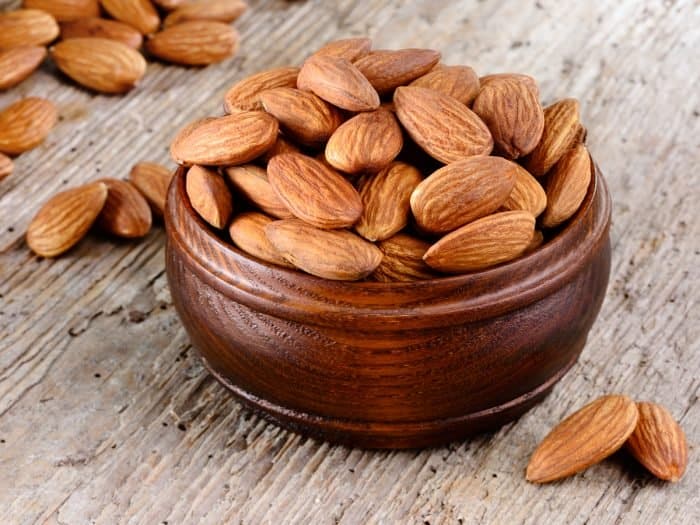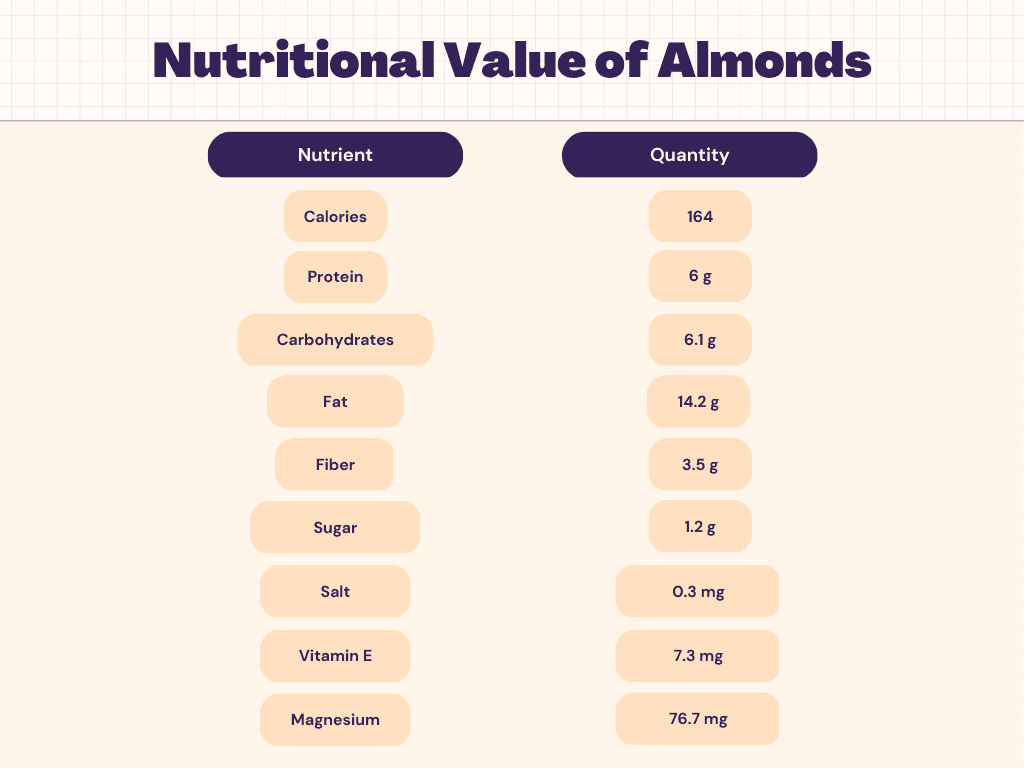Almonds are a nutritious, portable, low-carbohydrate food that may be used in cooking or consumed as is. You can get salted, unsalted, raw, or roasted almonds. Almonds have a wide range of uses. They can be ground to make almond meals, almond butter, or almond milk. Almonds are rich in fiber, protein, healthy fats, magnesium, and vitamin E. Almonds are good for your health since they lower cholesterol, blood pressure, and blood sugar levels. Additionally, they can lessen hunger and encourage weight loss.
Nutritional Value of Almonds
Nutritional Facts about Almonds
Carbs
Almonds include 6.1 grams of carbohydrates per serving. Almonds have a lower glycemic index than many other nuts and are a rich source of fiber.
Fats
A single ounce of almonds has roughly 22% of the daily recommended amount of fat, making them high-fat food. Almonds contain a large amount of monounsaturated fat, nevertheless.
Protein
With tiny levels of each necessary and non-essential amino acid, almonds are a good source of plant-based protein. An ounce of almonds has 6 grams of protein.
Calories
With 164 calories per ounce, almonds are a calorie-dense meal. Healthy fat makes up the majority of the calories, with smaller quantities coming from protein and carbohydrates.
Health Benefits Of Almonds
- Helps lower cholesterol levels – Consuming almonds has been associated with greater HDL cholesterol levels. Because it plays a crucial role in the removal of LDL cholesterol from the body, HDL is known as “good cholesterol.”
- Helps in reducing heart diseases – Almonds contain phytonutrients, including flavonoids and plant sterols, which have heart-healthy and antioxidant properties.
- Supports gut health – By encouraging microbiota richness and diversity, enhancing the microflora ratio, and increasing concentrations of health-promoting colonic bioactive, eating nuts can improve colon health.
- Helps in Weight Loss – Almond-rich meals made study subjects feel fuller and less hungry, which increased resting energy expenditure. Compared to other nuts, almonds also contributed to slight but significant reductions in body weight and fat mass. Check our Weight Loss Plans.
- Helps with Diabetes – Almonds may provide this effect since they are high in magnesium. However, additional data support the claim that eating almonds can prevent diabetes. Check out our Diabetes Plans.
Vitamins & Minerals in Almonds
37% of the daily necessary intake of vitamin E, 8% of the daily recommended amount of calcium, and 6% of the daily recommended intake of iron are all found in one ounce of almonds. Antioxidant qualities and immune system support are provided by vitamin E. Calcium is necessary to keep bones and teeth in good shape. Iron helps in the creation of certain hormones and provides oxygen to muscles. Manganese and magnesium are abundant in almonds. The metabolism of cholesterol, amino acids, and carbohydrates all depend on manganese.
The Bottom Line
Regular consumption of nuts may improve heart health and provide additional advantages.
Almonds are a fantastic choice for a daily snack since they contain protein, fiber, and micronutrients like vitamin E and iron. Almonds, both raw and roasted, are free of sodium and sugar, which is important for those who have a history of diabetes or hypertension or who want to reduce their intake for other reasons. Learn more about the nutritional makeup of almonds and the possible advantages of eating them by reading on.
FAQs
How many Almonds can I eat in a day?
Almonds are the tree nut with the highest concentration of protein, fiber, calcium, vitamin E, riboflavin, and niacin when measured ounce for ounce. Just keep in mind 1-2-3. The ideal daily serving of almonds is 1 ounce or roughly 23 almond nuts.
Should I eat Almonds before or after exercise?
They are one of the top post-workout foods. Protein, good fats, and other nutrients included in almonds aid in your body’s recovery after exercise. About 20% of our daily requirement for vitamin E is found in almonds. Almonds are a healthy snack to have after exercise.
What are the benefits of Almonds?
- Provide metabolic benefits
- Supports gut health
- Helps with diabetes
- Helps with weight loss and management
- Helps in lowering cholesterol
What is the best time to eat Almonds?
Almonds are delicious any time of day. Almonds are typically recommended as a mid-meal snack, such as a mid-morning or mid-afternoon snack, by the majority of dietitians.










